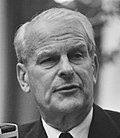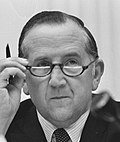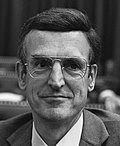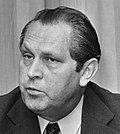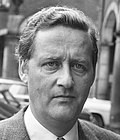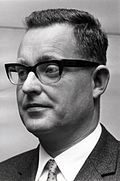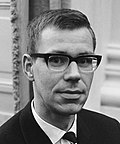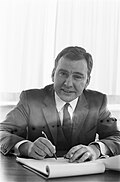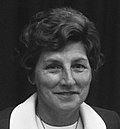| First Biesheuvel cabinet | |
|---|---|
Cabinet of the Netherlands | |
  The installation of the First Biesheuvel cabinet on 6 July 1971 The installation of the First Biesheuvel cabinet on 6 July 1971 | |
| Date formed | 6 July 1971 (1971-07-06) |
| Date dissolved | 9 August 1972 (1972-08-09) 1 year, 34 days in office (Demissionary from 19 July 1972 (1972-07-19)) |
| People and organisations | |
| Monarch | Queen Juliana |
| Prime Minister | Barend Biesheuvel |
| Deputy Prime Minister | Roelof Nelissen Molly Geertsema |
| No. of ministers | 16 |
| Ministers removed | 2 |
| Total no. of members | 16 |
| Member party | Catholic People's Party (KVP) People's Party for Freedom and Democracy (VVD) Anti-Revolutionary Party (ARP) Christian Historical Union (CHU) Democratic Socialists '70 (DS'70) |
| Status in legislature | Centrist Majority government |
| History | |
| Election | 1971 election |
| Outgoing election | 1972 election |
| Legislature terms | 1971–1972 |
| Incoming formation | 1971 formation |
| Outgoing formation | 1972–1973 formation |
| Predecessor | De Jong cabinet |
| Successor | Second Biesheuvel cabinet |
| Part of the Politics series |
| Politics of the Netherlands |
|---|
 |
| Constitution |
| Monarchy |
| Cabinet |
| States General |
| Judiciary |
| Elections |
| Local government |
| Foreign relations |
| Related topics |
|
|
The first Biesheuvel cabinet was the executive branch of the Dutch Government from 6 July 1971 until 9 August 1972. The cabinet was formed by the christian-democratic Catholic People's Party (KVP), Anti-Revolutionary Party (ARP) and Christian Historical Union (CHU), the conservative-liberal People's Party for Freedom and Democracy (VVD) and the social-democratic Democratic Socialists '70 (DS'70) after the election of 1971. The cabinet was a centrist coalition and had a slim majority in the House of Representatives with Protestant Leader Barend Biesheuvel a former Minister of Agriculture serving as Prime Minister. Prominent Catholic politician Roelof Nelissen the Minister of Economic Affairs in the previous cabinet served as Deputy Prime Minister, Minister of Finance and was given the portfolio of Suriname and Netherlands Antilles Affairs, former Liberal Leader Molly Geertsema served as Deputy Prime Minister and Minister of the Interior.
The cabinet served in the early years of the radical 1970s. Domestically it had to deal with the peak of the counterculture and a growing inflation but it was able to implement several social reforms to the public sector and stimulating deregulation and privatization. The cabinet suffered several major internal conflicts between the cabinet members of the Democratic Socialists '70 and the rest of the coalition which lead to the fall of the cabinet just 1 year into its term on 19 July 1972 with the Democratic Socialists '70 cabinet members resigning on 21 July 1972 and the cabinet continued in a demissionary capacity until it was replaced with the caretaker Second Biesheuvel cabinet on 9 August 1972.
Term
Problems of the cabinet were the release of war criminals (three of Breda) and the increasing inflation, combined with a stagnating economy (stagflation). The decision to cut government expenses was not supported by DS'70, so the cabinet lost its majority in the parliament, resulting in Biesheuvel II.
Minister Stuyt, the first minister for environmental affairs, issued an urgency-note concerning the environment. In 1972, the first report from the Club of Rome was published, which showed that the environment is in a bad state worldwide and that resources will eventually run out.
The cabinet recognised the GDR and voted to allow China back into the United Nations.


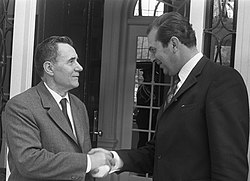
Cabinet members
Trivia
- Six cabinet members (later) served as Party Leaders and Lijsttrekkers: Barend Biesheuvel (1963–1973) of the Anti-Revolutionary Party, Molly Geertsema (1969–1971) of the People's Party for Freedom and Democracy, Norbert Schmelzer (1963–1971) of the Catholic People's Party, Dries van Agt (1976–1982) of the Christian Democratic Appeal, Willem Drees Jr. (1971–1977) of the Democratic Socialists '70, Bé Udink (1970–1971) and Roelof Kruisinga (1971–1977) of the Christian Historical Union.
- Five cabinet members had previous experience as scholars and professors: Dries van Agt (Criminal Law and Procedure), Louis Stuyt (Internal Medicine), Willem Drees Jr. (Public Economics), Kees Boertien (Commercial Law) and Roelof Kruisinga (Otorhinolaryngology).
- Four cabinet members (later) served as Queen's Commissioner: Molly Geertsema (Gelderland), Dries van Agt (North Brabant), Kees Boertien (Zeeland) and Henk Vonhoff (Groningen).
References
- "Ideeën van Drees jr. waren te afwijkend" (in Dutch). Volkskrant. 8 September 1998. Retrieved 1 May 2018.
- (in Dutch) Mooie Barend. De vergeten premier, Volkskrant, 9 June 2012
- (in Dutch) De driftbuien van Mooie Barend, Historischnieuwsblad.nl, 6 May 2001
- "Biesheuvel, Barend Willem (1920–2001)" (in Dutch). Huygens ING. 12 November 2013. Retrieved 20 May 2019.
- (in Dutch) Mr. B. W. (Barend) Biesheuvel 6 juli 1971 – 11 mei 1973, Geschiedenis24.nl, 9 December 2005
External links
- Official
- (in Dutch) Kabinet-Biesheuvel I en II Parlement & Politiek
- (in Dutch) Kabinet-Biesheuvel Rijksoverheid






